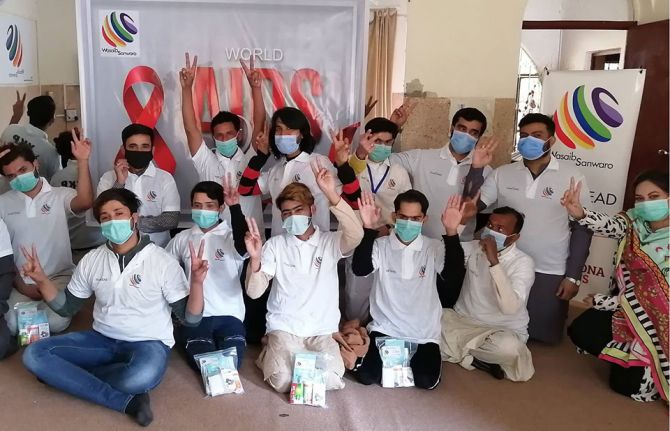

Feature Story
Making a mark on the COVID-19 pandemic: joint efforts to meet the needs of young key populations in Asia and the Pacific
10 February 2021
10 February 2021 10 February 2021Ralph Ivan Samson, the President of Y-PEER Pilipinas, and his team of young volunteers have been working tirelessly throughout the COVID-19 pandemic to supply antiretroviral therapy to young people struggling to get refills. “How could I sleep at night knowing that community members were depressed and anxious about their refills. I had young people texting me they were down to their last couple of pills,” said Mr Samson, remembering the initial COVID-19 outbreak in the Philippines in March 2020. It was at this moment that he knew he had to do something.
Throughout the region, civil society organizations like Y-PEER Pilipinas began looking into ways of overcoming the barriers and challenges that prevent young people from accessing HIV services due to COVID-19 restrictions. For example, Y-PEER gained support from local governments with special travel passes to enable the delivery of antiretroviral therapy from the hospital straight to the doorsteps of young people living with HIV.
Y-PEER Pilipinas was one of several beneficiaries of the COVID-19 Emergency Relief Fund, a regional small-grants programme established by Youth LEAD to support initiatives led by young people across Asia and the Pacific during the COVID-19 pandemic. The COVID-19 relief fund supported 12 organizations led by young people in nine countries with various projects, including the delivery of antiretroviral therapy, hygiene products, opioid substitution therapy, emergency supplies and food, cash transfer programmes for businesses run by transgender people and housing for key populations.
Youth LEAD’s efforts to mobilize resources during the early days of the pandemic are a testament to young people rising up to the occasion and working in coordination with regional partners of the HIV response in Asia and the Pacific. In their efforts to raise funds, Youth LEAD relied on the findings of a regional assessment on the needs of young key populations and young people living with HIV during the COVID-19 pandemic conducted by the Inter-Agency Task Team on Young Key Populations Asia Pacific (IATT on YKP), a regional coordinating platform comprised of United Nations agencies and young key populations regional networks. The results of this assessment helped to inform the IATT on YKP and its regional and national partners on ways to support organizations led by young key populations during the COVID-19 response. The evidence gathered through the survey was used to inform preparedness response plans and local strategies on providing timely information on COVID-19 prevention, supporting the delivery of antiretroviral therapy and tackling stigma and discrimination.
With the support received from Youth LEAD, Mr Samson and his team of volunteers provided condoms and lubricant and emergency supplies to young key populations and young people living with HIV across several provinces in the Philippines. The programme is known online as #GetCondomsPH, and a similar initiative led by young people from the COVID-19 Emergency Relief Fund supported the delivery of antiretroviral therapy to people’s doorsteps in Goa, India.
Aadi Baig, Programme Manager, and his team at Wasaib Sanwaro, an organization that works with gay men and other men who have sex with men and male sex workers in Pakistan, have also benefited from the COVID-19 Emergency Relief Fund. Mr Baig revealed a troubling picture of how the COVID-19 pandemic has made things worse for key populations. “The pandemic has created a greater divide among people, socially and economically, and has uncovered the lack of social security and protection programmes for key populations.”
With the support received, Wasaib Sanwaro donated food and supplies to key populations and provided basic HIV and COVID-19 training. Although there are limited funding schemes for organizations of young people across the region to access grants, regional networks of young people, such as Youth LEAD, Y-PEER and YVC, and the coordinated response by the IATT on YKP, which in 2020 was co-chaired by the UNAIDS Regional Support Team for Asia and the Pacific, the APCASO nongovernmental organization and the United Nations Development Programme, have stepped in to provide support.
As part of the work of the IATT on YKPs, a website that pools together COVID-19 resources for young key populations and showcases how young people have stepped up to respond to the COVID-19 pandemic was developed. The website also focuses on resources on the mental health of young key populations and the well-being of adolescents and young people at higher risk of HIV.
The most crucial aspect of all these activities was visibility, the visibility of young people, to ensure that young key populations and young people living with HIV had a voice during the pandemic. To keep the issues and needs of young key populations on the top of the advocacy agenda in the region, the IATT on YKP, with support from the UNAIDS Regional Support Team for Asia and the Pacific and Youth LEAD, held the first Spill the T with YKPs webinar—an online panel with young people from across the region that offered a platform for young people to talk about their initiatives and their roles in the COVID-19 response. The series continued through the collaboration of the IATT on YKP with partners and explored issues of young people’s leadership, mental health and sexual and reproductive health and rights.
Our work
Region/country
- Asia and Pacific
- Australia
- Bangladesh
- Bhutan
- Brunei Darussalam
- Cambodia
- China
- Democratic People's Republic of Korea
- Federated States of Micronesia
- Fiji
- India
- Indonesia
- Islamic Republic of Iran
- Japan
- Kiribati
- Lao People's Democratic Republic
- Malaysia
- Maldives
- Marshall Islands
- Mongolia
- Myanmar
- Nauru
- Nepal
- New Zealand
- Pakistan
- Palau
- Papua New Guinea
- Philippines
- Republic of Korea
- Singapore
- Solomon Islands
- Sri Lanka
- Thailand
- Timor-Leste
- Tonga
- Tuvalu
- Vanuatu
- Viet Nam
- Samoa



